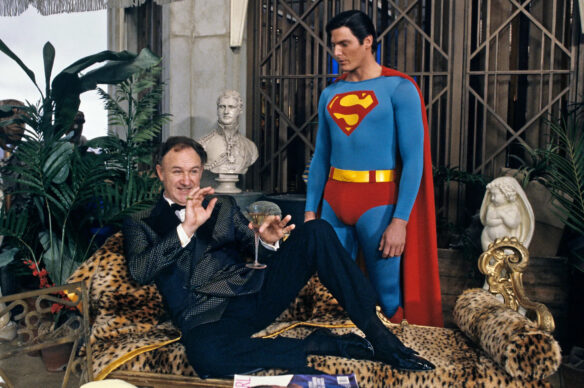
By Steve Vertlieb: How does one express grief at the passing of a stranger? How do we examine our mourning over the death of someone we do not know, or have never met? But we do know him. We have met … many times. He has been a substantial part of our lives for sixty years. Gene Hackman was a consummate actor, a consistent professional and endearing screen companion for more than half a century. From his beginning presence on network television on shows like The United States Steel Hour, Naked City, and Route 66 in the early 1960’s to his explosive rendering of Clyde Barrow’s brother, “Buck,” alongside Warren Beatty in Bonnie and Clyde in 1967, Hackman grew in theatrical stature over the ensuing decades, offering a wide variety of emotional palates and characterizations in a virtual master class of dramatic growth as an actor. His range of expression floated effortlessly from drama to comedy, while his intensity as an artist grew ever more startling and enduring with the ensuing decades.
As the son of an aging parent alongside Melvyn Douglas in I Never Sang for My Father in 1970, Hackman meticulously conveyed the anguish and frustration of an adult child having to deal with familial dementia, both loving and loathing his stern, unforgiving parent in the bitter throes of Alzheimer’s Disease. Their anger exploding into raging tirades, Hackman fights for his own personal identity and pride, while trying to understand and respect the dominance of his overbearing and controlling father. The battle for survival of wills by both father and adult son is often too painful for either to endure.
It was in 1971 that the visage and intensity of Gene Hackman dominated both the screen and audiences around the world in his commanding performance of real-life cop “Popeye” Doyle in William Friedkin’s brilliant thriller, The French Connection. Raging recklessly through the streets and subways of New York in search of a notorious drug dealer, Hackman captured the hearts and devotion of millions with his theatrical intensity, unfettered bravado and abandonment of civility in bringing to justice a criminal warlord.
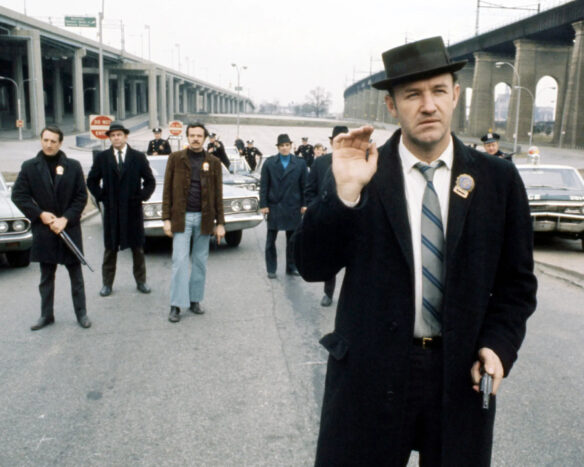
The following year saw Hackman burn up the screen yet again as a conflicted clergyman, devoid of faith, finding strength and inspiration once more in his heroism, battling frustration and physical obstruction while saving a handful of survivors in a calamitous sea disaster. Irwin Allen’s The Poseidon Adventure saw the rupture and nightmarish decimation of a luxury liner on New Year’s Eve, overturned in mid-ocean by a cataclysmic tidal wave. His courage, determination, and eventual self-sacrifice provided the memorable thriller with its heart and spiritual soul.
In Francis Ford Coppola’s complex, frenetic thriller, The Conversation in 1974, Hackman plays Harry Caul, a paranoid surveillance expert discovering a murder plot, while eavesdropping for a client. Caul’s meticulous machinations, and obsessive-compulsive behavior, lead him down a path of deception, betrayal, and ultimate emotional self-destruction. Hackman’s portrayal of Caul’s solitary intellectual dementia is a fascinating document of inner turmoil and mental sabotage. It is a superb performance.
1974 saw one of Hackman’s most bizarre, inspired, and brilliant comedic characterizations in Mel Brooks’ Young Frankenstein. A cinematic tribute to James Whale’s singular horror classic, Bride of Frankenstein (Universal, 1935), Hackman’s uncredited satirical rendering of O.P. Heggie’s original poignant blind hermit characterization opposite Boris Karloff is unforgettable comic insanity and genius. With Peter Boyle enacting the role of the “Monster,” Hackman’s burlesque interpretation of the bungling backwoodsman, physically hidden below layers of silver facial hair, is quite simply a delectable, utterly hilarious tour de force, and undeniably among the most iconic comedy sequences in cinema history.
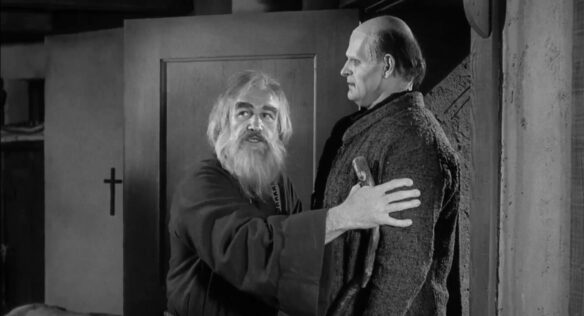
The first major big screen adaptation of Superman in 1978, directed by Richard Donner and starring Christopher Reeve as the “Man of Steel,” featured Gene Hackman in another satiric performance as Lex Luthor, Clark Kent’s wisecracking nemesis. Over the top, yet funny as hell, Hackman’s sarcastic conman is comically reminiscent of Dan Ayckroyd’s often bizarre, sleazy characterizations on Saturday Night Live, yet more cunningly sophisticated and intelligent.
Hoosiers in 1986 offered Hackman another outlet for his impassioned heroism as a small-town Indiana high school coach, daring his downtrodden basketball team to achieve greatness on the field. With thrilling musical accompaniment by veteran composer Jerry Goldsmith, and Hackman’s stubborn, yet inspiring belief in the power of dreams, the film is a rousing, vibrant, thoroughly entertaining success.
In 1987’s No Way Out, a vague remake of The Big Clock (1948), Hackman plays a severely compromised government official who, after a jealous rage, murders his lover, devising an intricate plot to shield his guilt by falsely implicating another. His insidious cowardice is his unwitting undoing.
Mississippi Burning, released in 1988 and directed by acclaimed filmmaker Alan Parker, is loosely based upon the 1964 investigation into the deaths of Chaney, Goodman, and Schwerner, three young civil rights workers in Mississippi, violently slain by hooded members of the Ku Klux Klan. Hackman, in a deeply felt, powerful performance as an FBI agent assigned to the case, brings both passion and personal rage to his performance, elevating this factual story of bigotry and racism in the Deep South to unforgettable dramatic intensity.
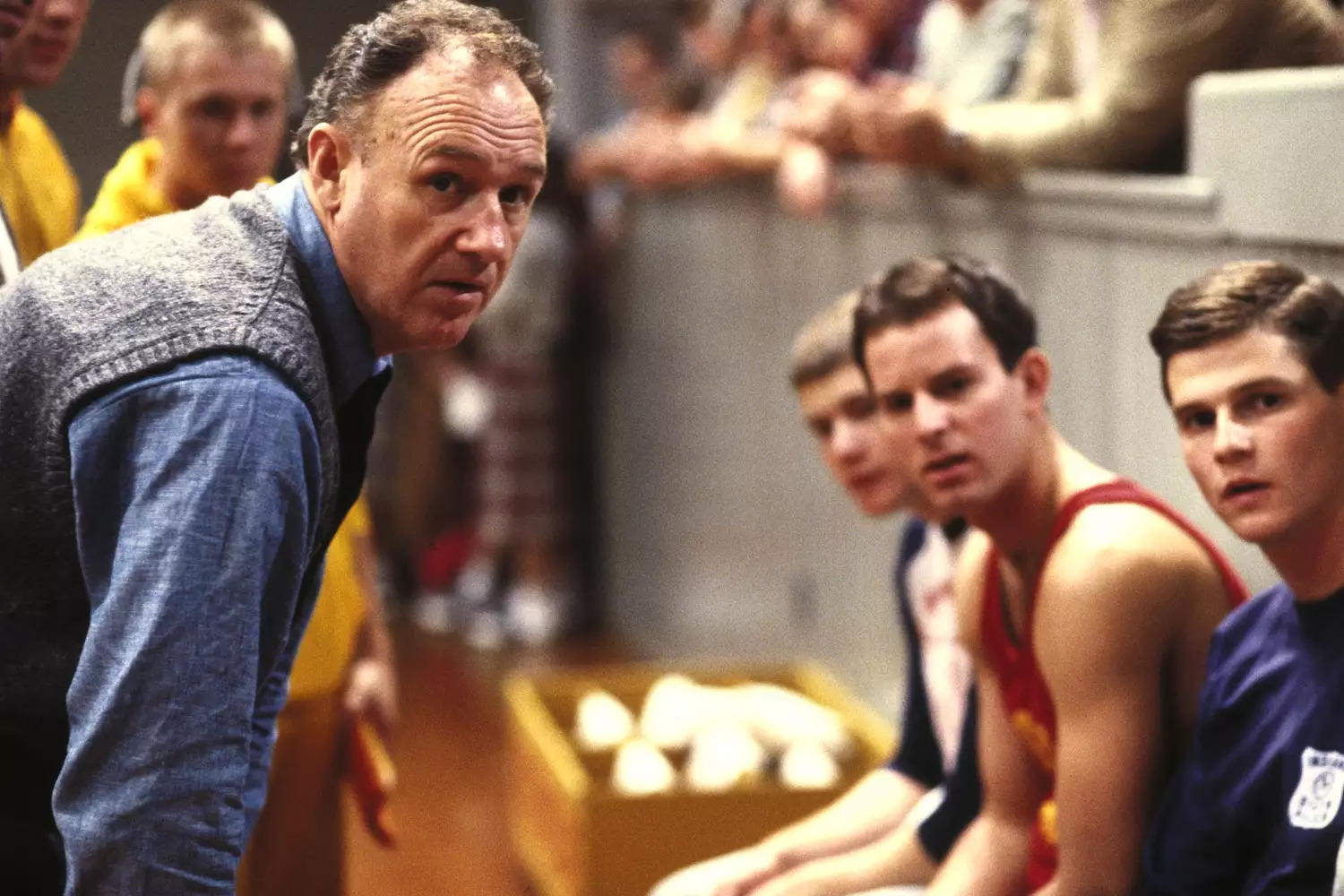
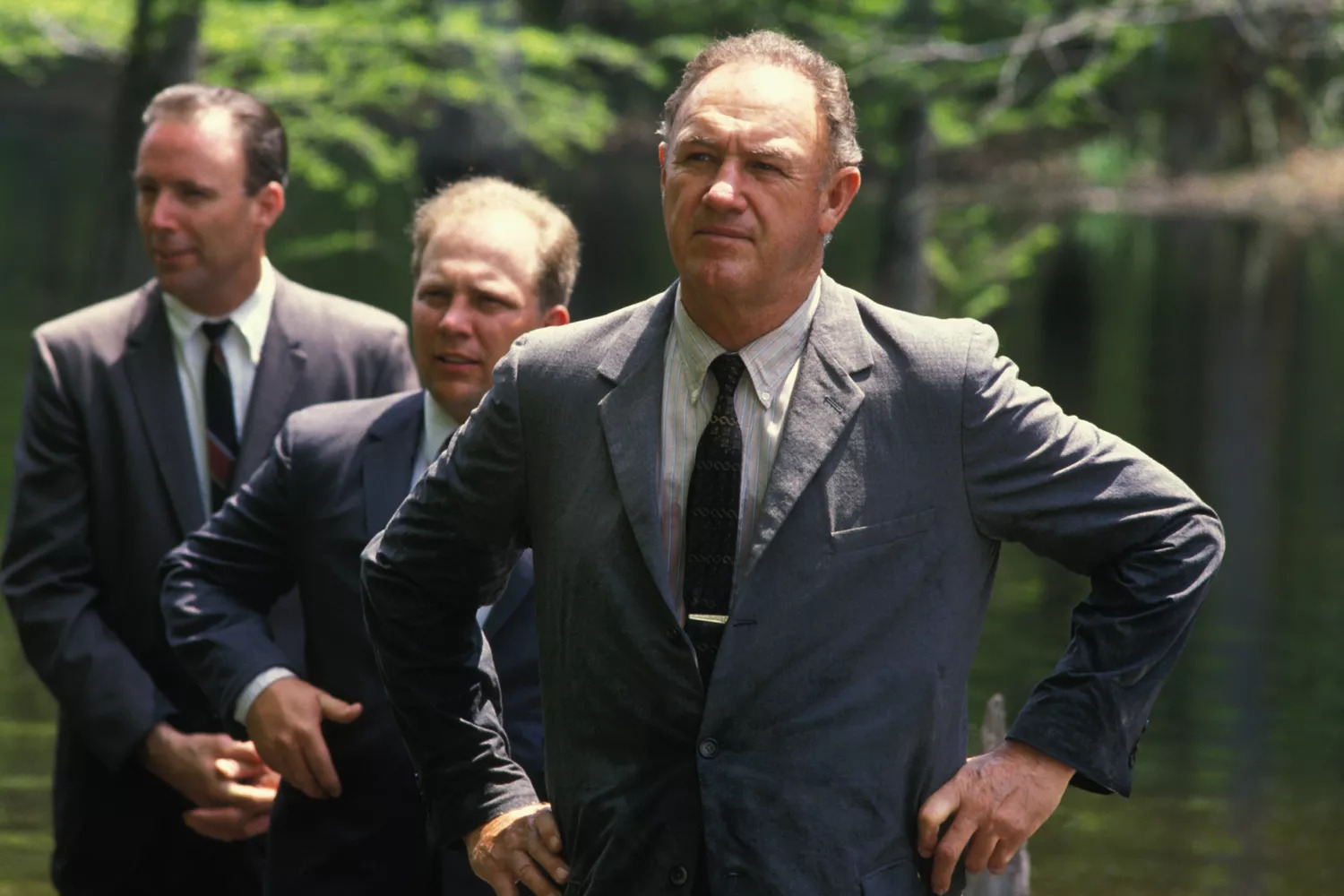
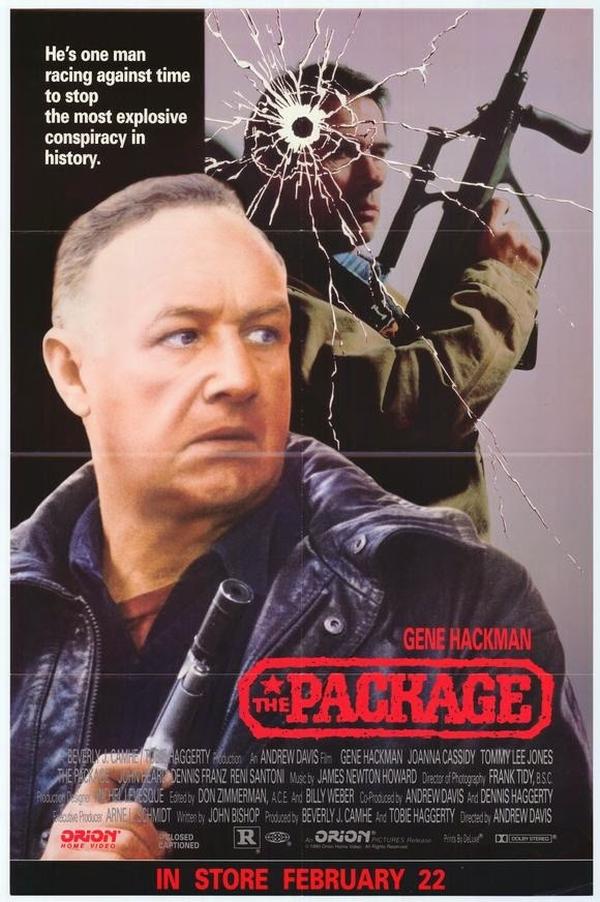

The Package, directed by Andrew Davis in 1989 is, in many ways, a companion piece to his fabulous 1993 remake of TV’s The Fugitive with Harrison Ford in the coveted role of iconic victim, Dr. Richard Kimble. Hackman plays U.S. Army Green Beret Master Sergeant, Johnny Gallagher, caught up in a complex mystery thriller concerning espionage, impersonation, and murder. Davis, a superb visual director, guides his star through a series of exciting set pieces and nerve-wracking sequences in which mistaken guilt and confusion mask a darker truth and sinister reality. Hackman’s believability as a military loyalist trying to climb his way out of a tunnel of intrigue and suspense is greatly enhanced by his sincerity and persona, making “The Package” an intense, involving, and believable political thriller.
Clint Eastwood’s 1992 revisionist western drama, Unforgiven, offered Hackman a gritty co-starring role opposite his director as vengeful, corrupted Sheriff,”Little” Bill Daggett, in a jagged reality showcase in which the actor joyously chews up the scenery with deliciously evil delight. Daggett runs his town with an iron fist and loaded gun, intoxicated with personal power and little tolerance for open dissent. In a violent finale to his cruelty, Daggett meets his end at the hands of an anti-hero, played to perfection by Eastwood.
The 1993 thriller The Firm starred Tom Cruise as a Harvard law graduate, enticed by Avery Tolar (Hackman) to join a celebrated boutique law firm with the promise of personal fortune and perks. Hackman’s firm operates outside the law, leaving legal and personal integrity aside, while servicing money laundering schemes with mob affiliations. Charming, yet deadly, Hackman fights his young protagonist with threats of assassination and professional disgrace when the younger Cruise discovers that what appears to be too good to be true, in all likelihood, is.
Lawrence Kasdan’s epic re-telling of the legend of Wyatt Earp in 1994 featured Hackman as the famed Marshall’s father, Nicholas Porter Earp, in a colorful character study of familial togetherness, loyalty and honor. While at times over long and ponderous, the film is highlighted by the actor’s always remarkable reliability and studied performance. An outstanding cast of character actors supported the film’s noble, if sometimes awkwardly misguided, aspirations.
Crimson Tide, a 1995 political thriller eerily reminiscent of The Bedford Incident, filmed thirty years earlier, in which a conservative destroyer commander played by Richard Widmark battles the convictions of a liberal reporter played by Sidney Poitier, leading to nuclear disaster. The latter film pits Hackman against Denzel Washington aboard a nuclear submarine as tensions flair against a backdrop of Russian/American relations and a dangerous battle for control of the vessel. Hackman remains a potent, powerful nemesis of Washington, eloquently dominating both his scenes and characterizations. Their battle of wills determines the tense outcome of their perilous combativeness, journey, and division.
Hackman expressed his desire to become a working actor at the age of eight. While studying acting, both Hackman and fellow student Dustin Hoffman were voted by their classmates as the least likely to succeed at their chosen craft. Gene Hackman was voted “Best Actor of the Year” by the Academy of Motion Picture Arts and Sciences for his Oscar winning performance as “Popeye” Doyle in The French Connection in 1971 and, again in 1992, winning the Oscar for “Best Supporting Actor” in Unforgiven.
Gene Hackman died at age 95 on or about February 27th, 2025 under tragic circumstances. We grieve for his loss … both to the arts and to the human spirit.

Discover more from File 770
Subscribe to get the latest posts sent to your email.

If you are looking for a handy guide to Gene Hackman films to watch here’s a handy compilation by allyourscreens.com…
Chris B.
https://www.allyourscreens.com/latest-news/u-s/3594-where-to-stream-every-gene-hackman-movie?utm_source=substack&utm_medium=email
Gene Hackman’s wonderful turn in Young Frankenstein was NOT uncredited! You are hardly alone in such a reference, but I don’t understand why this mischaracterization persists: Hackman’s name is right there in the end credits and always has been. Some critic once probably assumed it was the usual cameo and wrote about it that way, and every other writer then just regurgitated that description. Technically speaking, although short, it wasn’t even a cameo; it was a credited role.